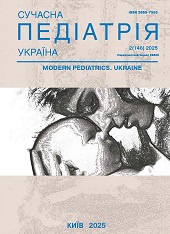The relationship between the reform of the nutrition system in preschool and school institutions and the health of children of different age groups
DOI:
https://doi.org/10.15574/SP.2025.2(146).4651Keywords:
preschool and school-age children, children's health, nutrition, nutrition system reformAbstract
Nutrition plays an important role in children's development, health, academic performance, and productivity.
Aim - to investigate how changes in the diet after the reform of the nutrition system in preschool and school institutions affect the health of children of different age groups.
Materials and methods. The study involved 216 surveyed parents who provided information about 309 preschool and/or school-aged children, divided into two groups: the Group 1 - children under 6 years old (n=64); the Group 2 - children over 6 years old (n=245). The following research methods were used: analysis of medical literature (PubMed, UpToDate), questionnaires, and statistical methods.
Results. After the implementation of the nutrition reform in educational institutions, the most noticeable and significant changes were a reduction in the amount of salt and sugar in meals, as well as an increase in dietary fiber. Preschool-aged children were significantly more likely to follow healthy eating habits at home compared to school-aged children (by 1.3 times). Overall, 52% of children received support from at least one parent regarding healthy eating outside educational institutions, with the Group 1 receiving such support more often, although the difference was not statistically significant. The transition to the new diet was easier for younger children (by 1.4 times). After the reform, the most notable health improvements in the Group 1 included a 1.6-fold decrease in vomiting and a 1.3-fold reduction in symptoms of constipation/diarrhea, while in the Group 2, there was a 1.5-fold decrease in heartburn and a 1.2-fold reduction in abdominal pain.
Conclusions. The reform of the nutrition system in preschool and school educational institutions had a positive impact on children's health, especially when supported by the family and accompanied by adherence to healthy eating at home.
The authors declare no conflict of interest.
References
Baker CW, Brownell KD, Whisman MA. (2000). Studying intergenerational transmission of eating attitudes and behaviors: Methodological and conceptual questions. Health Psychology. 19: 376-381. https://doi.org/10.1037//0278-6133.19.4.376; PMid:10907656
Ballard KT. (2013). Improved nutrition through school food programs. Pediatric Annals. 42(9): 376-378. https://doi.org/10.3928/00904481-20130823-12; PMid:23992219
Cianfarani S, Deodati A, Inzaghi E, Pampanini V. (2022, Apr 22). The Effects of Nutrition on Linear Growth. Nutrients. 14(9): 1752. https://doi.org/10.3390/nu14091752; PMid:35565716 PMCid:PMC9100533
Kabinet ministriv Ukrainy. (2020). Pro zatverdzhennia planu zakhodiv z reformuvannia systemy kharchuvannia v zakladakh osvity. Rozporiadzhennia Kabinetu ministriv Ukrainy vid 5 serpnia 2020 r. No.1008-r.
Kabinet ministriv Ukrainy. (2023). Pro skhvalennia Stratehii reformuvannia systemy shkilnoho kharchuvannia na period do 2027 roku ta zatverdzhennia operatsiinoho planu zakhodiv z yii realizatsii u 2023-2024 rokakh. Rozporiadzhennia Kabinetu ministriv Ukrainy vid 27 zhovtnia 2023 r. No.990-r.
Khan NA, Willis N. (2020). Health Behaviors and the Developing Brain: Nutrition Effects on Childhood Executive Control. 95: 127-135. https://doi.org/10.1159/000511513; PMid:33166986
Konoplitska AP, Antonets VA, Rudenko GM, Oniskova OV, Chornopyshchuk NP, Rusak SO et al. (2019). Clinical features of pathology of digestive organs in children of Vinnytsia and Zhytomyr regions. Journal article. Modern pediatrics. Ukraine. 8(104): 48-51. https://doi.org/10.15574/SP.2019.104.48
Saavedra JM, Prentice AM. (2023, Jul). Nutrition in school-age children: a rationale for revisiting priorities. Nutrition Reviews. 81(7): 823-843. https://doi.org/10.1093/nutrit/nuac089; PMid:36346900 PMCid:PMC10251301
World Health Organization. (2003). Skills for Health: Skills-based Health Education Including Life Skills: An Important Component of a Child-friendly/Health-promoting School. Organisation mondiale de la Santé.
Downloads
Published
Issue
Section
License
Copyright (c) 2025 Modern pediatrics. Ukraine

This work is licensed under a Creative Commons Attribution-NonCommercial 4.0 International License.
The policy of the Journal “MODERN PEDIATRICS. UKRAINE” is compatible with the vast majority of funders' of open access and self-archiving policies. The journal provides immediate open access route being convinced that everyone – not only scientists - can benefit from research results, and publishes articles exclusively under open access distribution, with a Creative Commons Attribution-Noncommercial 4.0 international license (СС BY-NC).
Authors transfer the copyright to the Journal “MODERN PEDIATRICS. UKRAINE” when the manuscript is accepted for publication. Authors declare that this manuscript has not been published nor is under simultaneous consideration for publication elsewhere. After publication, the articles become freely available on-line to the public.
Readers have the right to use, distribute, and reproduce articles in any medium, provided the articles and the journal are properly cited.
The use of published materials for commercial purposes is strongly prohibited.

